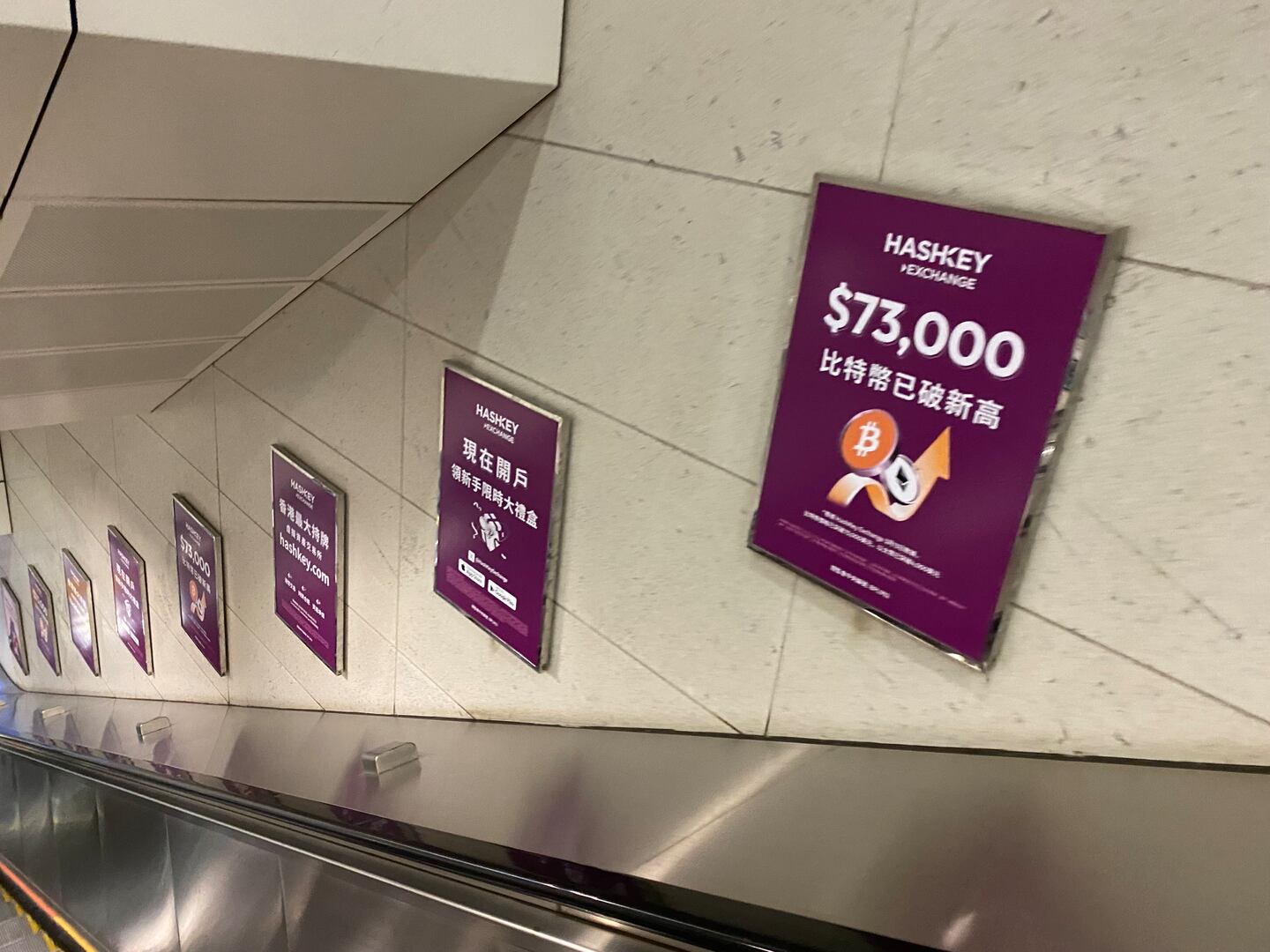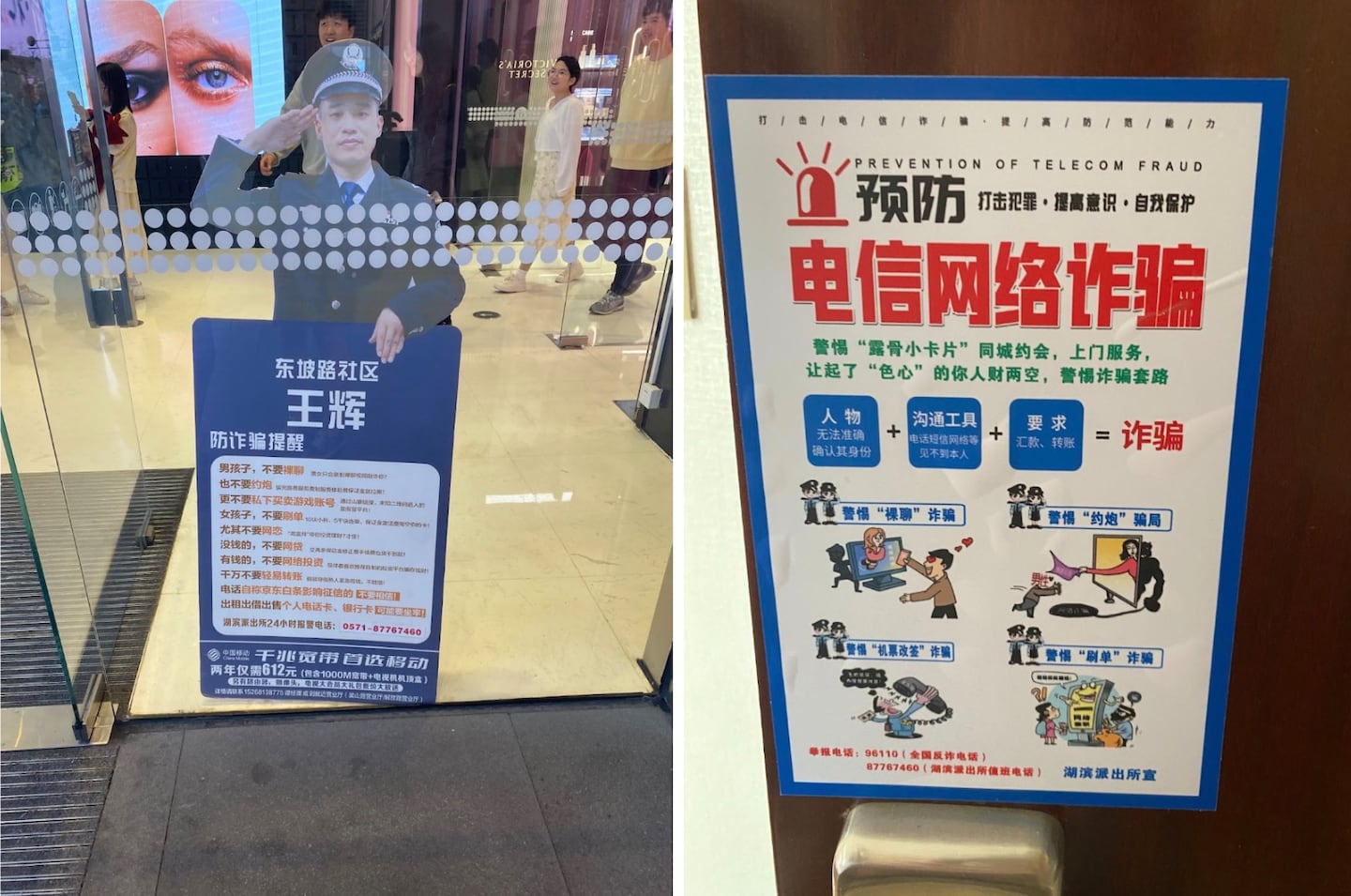- Even as crypto fraud surges a new wave of promotions is touting the riches to be made in Bitcoin.
- Investment warnings make their way into Chinese hotel rooms.
- Cyberport web3 hub scrutinised after ransomware attack.
You can tell a lot about the mood towards crypto in Hong Kong by the ads on public transport. These days, pro-crypto messaging is creeping back onto the walls of metro stations and the sides of buses.
Visit Hong Kong MTR station and you’ll see Hashkey Exchange telling you that Bitcoin has hit new highs. Over and over again. All the way down the escalators from the IFC mall.

Once upon a time, Hong Kong was a simpler place where companies like JPEX and influencers running over the counter trading stores could buy advertising for their services with little regard for how legitimate their operations were.
Following the $200 million collapse of JPEX in September last year, these crypto ads were replaced by warnings from the Securities and Futures Commission about investment risks.
Central bank song
The Hong Kong Monetary Authority even recorded and released a song warning investors how to avoid getting scammed.
“Clicking on the wrong link will give you a headache / you have to be aware of scammers / everyone should remember that / don’t click on random links,” sings Cantopop singer Wan Kwong and Arthur Yuen, the central bank’s deputy chief executive .
(It’s catchier in Cantonese, I swear.)
Floki, a dog-themed memecoin with a market cap of $1.9 billion, was banned from advertising in Hong Kong because they couldn’t explain the high returns on their staking product to the satisfaction of regulators.
But now, with crypto on fire and Hong Kong poised to approve Bitcoin ETFs, the crypto advertising returns.
Along with Hashkey, CSOP Asset Management, which issues Bitcoin futures ETFs in the city, is running bus ads telling the citizenry that Bitcoin rose by 45% in the first two months of 2024.
And Floki may not be allowed on public transport, but I spotted it at WOW Summit distributing material about how the project was targeting mainland Chinese residents with their latest blockchain game. That’s despite the ban on virtual assets in the country.
The comeback of crypto promotion comes as Hong Kong Chief Executive John Lee assures everyone the city is thriving business-wise.
But that doesn’t mean the free-for-all is back. The SFC has taken its mission to protect people from suspicious virtual asset platforms to a whole new level by adding a big, flashing red button to its website.
It links to the ever-growing alert list for suspicious trading platforms. It also sports a new red banner naming and shaming the most recent additions to the list.
Warnings on the Mainland
Meanwhile over the border, China is also beefing up the public notices warning about online fraud. On a recent trip to Hangzhou and Shanghai, there were even posters in my hotel room warning me to stay on guard against online scammers.

Warnings were also spotted on billboards in shopping malls and on Nanjing Road, Shanghai’s equivalent to London’s Oxford Street.
More Asia News: Cyberport gets told off for poor cyber security
Cyberport, the area of Hong Kong home to some of the city’s biggest crypto and web3 companies, has been directed by the Office of the Privacy Commissioner for Personal Data to shore up its cyber security provisions following a ransomware attack.
Cyberport reported a data breach after a hacker group calling itself Trigona encrypted their files and demanded a ransom to unlock them.
The incident caused the leaking of personal data of more than 13,000 individuals, including unsuccessful job applicants and former employees.
Privacy Commissioner, Ada Chung said that Cyberport should have implemented adequate organisational and technical security measures to safeguard its information systems that contain personal data.
Instead, it failed to implement sufficient and effective measures to ensure the security of its information systems and had failed to promptly delete data in respect of which the retention periods had expired in accordance with its data retention policy.
As of September 2023, Cyberport is home to around 190 web3 companies.
Quick bites
- Google is suing two Chinese software developers in New York over claims the devs stole money from thousands of people who downloaded their fake crypto exchange apps.
- The Monetary Authority of Singapore introduced new crypto legislation last week that will expand its ability to regulate digital asset custody, cross-border payments and payments and transfers involving tokens.
Got an Asia crypto story? Get in touch at callan@dlnews.com.









